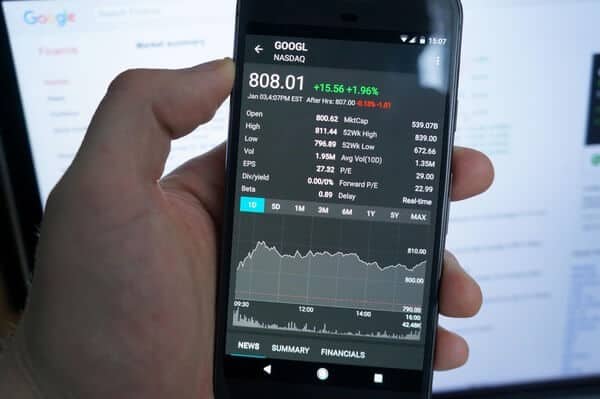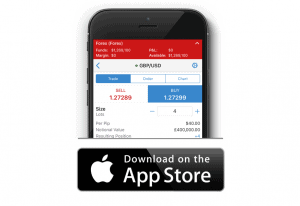As stock apps are going commission-free, more people are beginning to invest in stocks. But with so much variety to pick from, which stock app should you go for? In this guide, we will present the best stock apps for 2020 and beyond.
On this Page:
What is a Free Stock Market App?
A free stock app is very similar to a traditional stock application like Fidelity or TD Ameritrade. However, those applications charge a fee for every trade made on the platform. This used to work, back when the economy was a little bit different.
Now, younger people, the millennials, don’t have nearly as much money to invest. To get these age groups involved, free stock apps like Robinhood removed this commission fee, both lowering the risk on and streamlining the investment process.
Best Free Stock Trading Apps for 2020
When it comes to choosing a stock app, the right choice depends on how often you want to trade and how much you can invest and commit to this long term. In the following list we will present the best free stock apps acccording to our tests, which should help you find the best tool for your needs.
How do stock apps make money?
Stock apps charge commission fees so they can make a profit. If apps stop doing that, how do they bring in money? Well, a few different ways. We’re going to use Robinhood as an example.
Launching in 2014, Robinhood took off due to its lack of commission fees on transactions. In comparison, many stock market apps charge anywhere from $1 to $7 per trade, according to Investopedia. That said, these alternate platforms provided a ton of information regarding the stock such as news, charts, research, and more, which Robinhood failed to do at the start. While this sounds like a negative, the app used their lack of data to its advertising advantage, claiming that the information provided by these apps was overrated and not worth the fees.
How else do free stock broker apps make money?
One way free stock apps including Robinhood make money is via gathering interest on stored cash in investor accounts. That’s actually a traditional method of profit for these platforms. On top of this, Robinhood charges $10 for every phone-assisted transaction made, on top of $35-50 for foreign trades.
In addition, according to a blog post by Robinhood co-founder and co-CEO, Vlad Tenev, the company earns rebates for every dollar traded. This is best explained through a quote from co-CEO Vlad Tenev:
“The revenue we receive from these rebates helps us cover the costs of operating our business and allows us to offer our services with no commission. Robinhood earns ~$0.00026 in rebates per dollar traded. That means if you buy a stock for $100.00, Robinhood earns 2.6 cents from the market maker. Other brokerages earn rebates and charge you a per-trade commission fee.”
A third way is through order flow. This process is based on small orders that are difficult for a broker to fill. So, the application sends this order to a dealer, who pays the application a fee for this privilege. The dealer then takes commission from the order.
Bloomberg reported last year that Robinhood makes over 40% of its revenue thanks to order flow. This is a controversial method that sends “orders to market makers that allow you to receive better execution quality and better prices,” details the apps website. “Additionally, the revenue we receive from these rebates helps us cover the costs of operating our business and allows us to offer you commission-free trading.”
While it sounds ideal, this process isn’t entirely transparent. Most stock exchange transactions are processed in a public format, but this is done privately, which raises suspicion.
Finally, in the case of Robinhood, there is a premium service that charges different monthly fees. The application makes a significant profit from these payments, which investors are happy to pay for the added benefits. The premium service provides extra buying power in tiers of $1000, $1,500, and $2,000. These come in at $6.00, $9.00, and $10.00 a month, respectively.
Robinhood is still a relatively new stock application. While these no-commission trades have proven invaluable for bringing in customers, we’ve yet to see how the app will survive in the long run. If its methods of profit are sustainable, we may be witnessing the birth of a new form of stock trading.
How safe are stock trading apps?
When it comes to online trading, one of the most important things to consider is platform safety. We would not recommend investors to trade on unregulated platforms due to the fact that it could pose serious risks to your capital. Many unregulated Cryptocurrency exchanges get hacked on a weekly basis, most recently Binance with over 7,000 bitcoins stolen on May 7th 2019. However, these security concerns are not limited to crypto exchanges, and stock brokers are susceptible to such hacks or data breaches. Although most registered mobile apps feature a good variety of security measures, security risks persist.
For this reason, we would recommend a platform which holds several financial regulations such as Robinhoog, and which is reputable, with a large user data base. We would therefore highly recommend all stock traders to get started with the Robinhood app in order to have a safe experience.
Tips for choosing a stock market app
In order to assist you in your search, check out the following tips.
- Investment types
There are all sorts of different investment types for the average trader. These include but are not limited to traditional stocks, exchange-traded funds (ETFs), cryptocurrencies, and Options. Depending on what you’re looking for you may want an app that provides one or all of these. It’s also not a bad idea to start with one and move onto a more advanced application later on.
- Ease of Use
Of course, while using an app makes the actual investment process easier, this doesn’t help you if the user interface barely works. When looking at the different applications, examine how you flow through the process. Pay attention to what works and what doesn’t and make sure you’re not wasting time trying to figure out the menu process.
- Reputation
As with any application you’re putting money into, pay attention to its background. Is the userbase generally happy with the provided services? Was the group ever involved in shady business practices or legality issues? See what the world has to say on a service before investing your time and money into it.
- Research
Does the tool provide in-app research for investors? What sort of information does it give that can help users make a quality trade? Robinhood, for example, includes expert analysis on if the stock is worth buying, selling, or holding. That and users can view stock-related news without having to leave the application.
- Automation
If you’re just getting into the stock market, an automated process might be your best bet. Even with free software, it’s hard to make that first step in giving away your money. Applications like Acorns and M1 Finance have some form of this, allowing users to make a passive income without even trying.
- Deposit Minimums
While some applications don’t require a deposit minimum to get started, those that do could charge a lot of money. This upfront fee is usually worth the investment, but only if you can afford it in the first place. M1 Finance and Fundrise charge a $100 and $500 minimum, respectively but also bring with a ton of services to justify the asking price.
How much money can I save by using a free stock market app?
You can save a surprising amount of money by using a commission free app. Of course, it depends on the platform, but say you’re paying $5 per trade. Once or twice that’s fine, but if you trade 10 times that’s $50 dollars. This money would be way better off in the stock market making you money, rather than spending it trying to invest.
Are there any other costs in using these trading apps?
Yes, there actually are other costs involved. That said, commissions are the most common ones. Below are the other costs you may see when using these apps:
Margin interest
This is when an app charges an investor who trades with borrowed money, otherwise known as “on margin”. Depending on the application, you’ll have to pay a variety of different annual percentage rates based on how much you borrow.
Taxes
Then there’s taxes. Don’t forget that you must pay taxes on all of your different investments, and short term investments are taxed higher than other capital gains. Moreover, some of these applications charge “fund expenses,” which is taken from your profits automatically. This ensures the platform can keep running commission free.
How We Rated These Stock Apps
When looking at the different commission free stock apps, we considered a few different key aspects.
- ✅Quality of service : What’s most important, of course, is that despite having no commissions, these applications should bring in quality services as well. No fees is not an excuse for lackluster features.
- ✅Investment types: We also paid attention to the investment types such as stocks, exchange-traded funds, or cryptocurrencies.
- ✅Ease for use : We also paid attention to ease of use. Are these apps useful for beginners or only experts? Fortunately, there’s a good variety of both. Some services automate the investment process, while others require the user’s attention. Others more stuck with only easy features while some include some advanced options for long-term investors.
- ✅ Features: Overall, the commission free stock applications we paid most attention to were those that gave the investor options. Each one on this list has a variety of approaches one could take, alongside some features for every time of investor.
Conclusion
If you’ve read our guide from start to finish, you now have a solid understanding of how stock apps work. Each of these apps provides a different experience a little unlike the rest of them on the list. Hopefully, our guide helped you in your decision-making process, and you’ll find one that gets you started and staying in the world of investments.
FAQs
It all depends on your investment needs. Take a closer look at the reviews up above to decide which application is best for you!
The charges vary from application to application. While none of these listed have commission fees, there can still be some other charges. For example, M1 Finance has a $100 initial charge to get involved. Make sure you can pay for these fees ahead of time.
All sorts of different assets. Some applications support traditional stocks, while others bring Options, ETFs, and even cryptocurrencies.
Because there isn't a commission fee on trades, it's much easier for investors to diversify their portfolios. Without a fee, you'll be much more willing to invest into different stocks you wouldn't normally have done so beforehand. Some applications like M1 Finance do the dividing for you. All you have to do is provide the funds!
In some ways, yes. For example, a lot of these applications are fairly basic and only provide an elementary look at stock markets. That said, they're also a great way to start with stocks, as they save you money and only focus on the essentials. However, if you're looking to become an advanced trader later on, you'll want to move over to more traditional applications once you get the hang of things. Just make sure to find one with low commission fees! Which commission free platform is best for buying stocks?
What fees do commission free apps charge?
What assets can stock market mobile apps be used to purchase?
Do commission free stock apps help me diversify?
Are there any disadvantages to using stock mobile apps?

